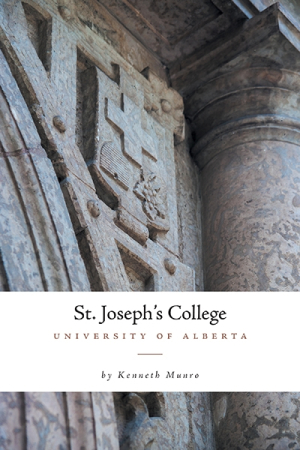
St. Joseph's College
University of Alberta
This exhaustive, occasionally playful account chronicles one religious college’s struggle to make a name for itself in a more established and secular academic setting.
St. Joseph’s College by Kenneth Munro, an intricate historical examination of a small religious college located on a larger public university campus, will interest educators and college administrators.
Due to funding shortfalls and run-ins with competing academic pursuits, St. Joseph’s College has struggled through a century of social and political upheavals. Still, despite changes in Roman Catholic congregations and engagement, prevailing educational philosophies, and the hardships of war and financial stress, St. Joseph’s College eventually grew to thrive as an institution. The persistence of the Catholic priests who run it, as well as of Roman Catholic contributors who believe in its mission, are an inspiration within Catholic and private education.
St. Joseph’s early years were marked by an identity struggle, as it worked to distinguish itself as a specifically Catholic college. Friction between Catholic and secular educational doctrine persists throughout the book, making this microcosm a potential case study for educators who want to know more about the intersection of spiritual study and public education.
The guiding light of St. Joseph’s is the glory of God and the provision of religious education to Catholics, but its entanglement with the University of Alberta gives it a baseline set of survival requirements that will be familiar to many an educational administrator. These include not only funding problems, but also issues of academic bureaucracy, complicated treaties with the larger university, and massive staff changes. Amid all of this, the college struggles to draw students, constantly facing existential questions about its purpose as an institution.
St. Joseph’s College is nothing if not exhaustive. Seemingly every footstep on the college’s path to prosperity is documented within these pages, with details increasing exponentially as years progress, making it an invaluable resource to those interested in the history of the school. However, this meticulous record-keeping can make for dry prose. While there are a few salacious bits and anecdotes–allegations of coed nude bathing, for example–the focus of St. Joseph’s College is on recording history.
The college’s constant struggle for funding and its jostling with the secular, research-oriented University of Alberta provide a continual source of tension. Portraits of many of the brothers who have taught at the college are well fleshed-out and may be of genealogical interest. Details of their personalities and predilections will resonate with those who have affection for members of Catholic educational congregations, particularly Basilians.
Following the college from its inception to the present day, this work traces the arc of a developing academic institution. The fact that St. Joseph’s takes a path independent from its surroundings gives St. Joseph’s College a pleasing underdog quality that will engage anyone who is inclined toward topics of academic institutional development.
Reviewed by
Anna Call
Disclosure: This article is not an endorsement, but a review. The publisher of this book provided free copies of the book and paid a small fee to have their book reviewed by a professional reviewer. Foreword Reviews and Clarion Reviews make no guarantee that the publisher will receive a positive review. Foreword Magazine, Inc. is disclosing this in accordance with the Federal Trade Commission’s 16 CFR, Part 255.
